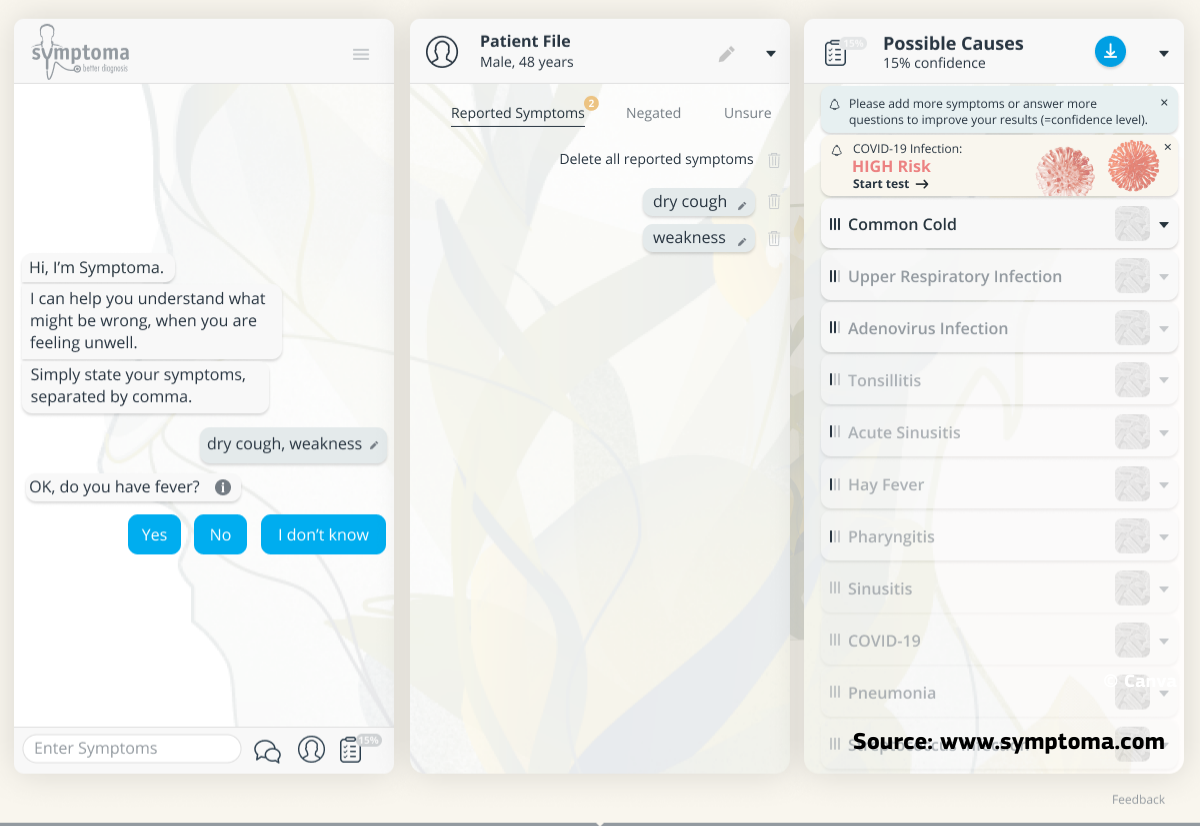European start-ups and researchers are working closely with hospitals and government entities to accelerate innovation and technology as the virus continues to spread in different countries. Here are 5 EIC projects exploring already the fight against the contagion phenomena with data, AI and high-tech.
AI Chatbot: Symptoma is developing a technology and solution to mass screen citizens with the risk of COVID-19. The company is currently working on a multilingual and remote platform for medical review and triage of flagged cases. The company wants to capitalize the first AI-based chatbot assessing each citizen’s risk of having contracted the specific virus. The system can remotely screen suspected COVID-19 cases in 36 languages. Symptoma wants to help health authorities worldwide to efficiently screen the population as a first-line defence against COVID-19 and any other potentially emerging epidemics.
Discover here the key results: https://ec.europa.eu/info/funding-tenders/opportunities/portal/screen/opportunities/horizon-results-platform/22645
EU Contribution: 2.282.000 €
Country: Austria

Research Data Capture Platform: When novel strains of viruses like the Coronavirus emerge, data quickly becomes the most valuable asset. According to the CEO of Castor, Derk Arts, MD, PhD, “the lack of quality data should not be the reason for a delay in developing vaccines and treatments.” Castor has joined the global fight against the Coronavirus by making their research data capture system available for free for all non-profit COVID-19 research projects. As of March 23, more than 50 COVID-19 research projects are running on Castor. The company created standardized electronic case report forms (eCRFs) based on WHO CRFs to help researchers start their studies or registries in less than an hour. Castor is also providing a hosted FAIR data point with all related research catalogues (datasets).
Watch a video tutorial on how to capture data in eCRFs created in Castor for a COVID-19 study:
Download Castor's eCRFs: http://www.castoredc.com/castor-ecrfs-who-covid19-13feb2020
EU Contribution: 1.083.250 €
Country: The Netherlands
Mobile app: PINPOINT INNOVATIONS LTD is currently developing a phone-based app version of the patient tracking systems. This company is also responsible for Tracworx - the data analytics tool allows hospitals to establish bottlenecks in patient flow, while understanding the efficiencies and ultimately their true capacity. The system works in real-time, communicating vital information to staff while also giving feedback on how the organisation is performing. Tracworx can improve the recording of treatment costs and helps to achieve optimal process efficiency.
EU Contribution: 2.919.828 €
Country: Ireland
ICT tools: CIMPLEX proposes ICT tools to predict and influence disease spread and other contagion phenomena in complex social systems. The research combines large scale, realistic, data-driven models with participatory data-collection and advanced methods for Big Data analysis. The project interconnects contagion progression (e.g. epidemics) with social adaptation, the economic impact and other systemic aspects that finally allow a complete analysis of the systemic risk. CIMPLEX aims to evaluate the system with policymakers and citizens focusing on the concrete problem of epidemic spreading.
EU contribution: 3 450 625 €
Country: Germany
FET PROACTIVE / Coordinator: DEUTSCHES FORSCHUNGSZENTRUM FUR KUNSTLICHE INTELLIGENZ GMBH
Tech for viral infections diagnosis: VIRUSCAN aims to provide a novel technology able to identify viral particles and asses their infective potential through the characterization of two physical parameters: mass and stiffness. With this technology, VIRUSCAN will provide personalized treatment to the patients, reduce the use of not effective antibiotics, increase safety in blood transfusions, allow a quick and trustworthy response to emergency situations (e.g. recent EBOLA in West Africa and the ZIKA in Brazil), reduce the spread of viral infections, reduce costs per analysis and screen a wide range of pathogens.
EU contribution: 7 148 586 €
Country: Spain
FET PROACTIVE / Coordinator: AGENCIA ESTATAL CONSEJO SUPERIOR DE INVESTIGACIONES CIENTIFICAS

DISCLAIMER: This information is provided in the interest of knowledge sharing and should not be interpreted as the official view of the European Commission, or any other organisation.

